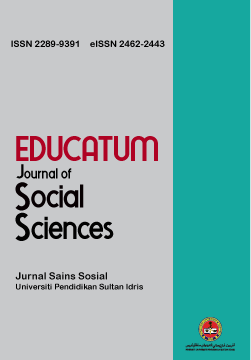The self-care behaviour association with quality of life among Chinese ethnic with heart failure in Malaysia
Perhubungan antara tingkah laku penjagaan diri dan kualiti hidup di antara etnik Cina dengan kegagalan jantung di Malaysia
DOI:
https://doi.org/10.37134/ejoss.vol7.1.8.2021Keywords:
Heart failure, Malaysia, Chinese ethnic, Quality of life, Self-careAbstract
The aim of this study is to determine the association between self-care behaviour and quality of life among the Chinese ethnic with heart failure (HF) in Malaysia. A cross-sectional survey design was conducted with 80 HF patients. The average age of participants was 61.39 years old (M = 61.39, SD = 15.88). Chinese version of Self-care Heart Failure Index version 6.2 and the World Health Organization Quality of life-BREF were utilized in this study. Pearson’s correlation and t-test were tested to run the analysis. Current findings suggested that the construct of confident to conduct self-care is significantly correlated positively with quality of life (r = .41, p<0.01). There is a significant difference in self-care management between genders [t(78) = -2.94, p=.00] and illness comorbidities [t(78) = -2.07, p=.04]. Hence, it is suggested that element of confidence is one of the important factors to be considered in future self-care interventions. Through this study, researchers and health-care providers could deduce effective interventions and education considering genders and illness comorbidities in order to improve self-care behaviours and quality of life.
Abstrak
Tujuan kajian ini adalah untuk mengetahui perhubungan antara tingkah laku penjagaan diri dan kualiti hidup di antara etnik Cina kegagalan jantung di Malaysia. Kajian tinjauan keratan rentas dilaksanakan pada 80 pesakit kegagalan jantung. Umur rata-rata peserta adalah 61.39 tahun (min = 61.39, sisihan piawai = 15.88). Indeks Kegagalan Jantung Rawatan Penjagaan Diri versi 6.2 dan Kualiti Hidup Organisasi Kesihatan Sedunia-BREF versi Cina digunakan dalam kajian ini. Korelasi Pearson dan ujian-t adalah ujian untuk menjalankan analisis. Penemuan semasa menunjukkan bahawa keyakinan diri berkorelasi positif secara signifikan dengan kualiti hidup (r = .41, p <0.01). Terdapat perbezaan yang signifikan dalam pengurusan penjagaan diri antara jantina [t ( 78) = -2.94, p = .00] dan komorbiditi penyakit [t (78) = -2.07, p = .04]. Justeru, intervensi harus dilaksanakan untuk meningkatkan keyakinan diri agar kualiti hidup meningkat di kalangan etnik Cina pesakit kegagalan jantung dengan mempertimbangkan perbezaan jantina dan komorbiditi. Melalui kajian ini, penyelidik dan penjawat perubatan dapat menyimpulkan intervensi dan pendidikan yang berkesan dengan mempertimbangkan jantina dan komorbiditi penyakit untuk meningkatkan tingkah laku penjagaan diri dan kualiti hidup.
Kata kunci:Kegagalan jantung, Malaysia, Etnik Cina, Kualiti Hidup, Penjagaan Diri
Downloads
References
Barnason, S., White-williams, C., Rossi, L. P., Centeno, M., Crabbe, D. L., Lee, K. S., Wood, K. (2017). Evidence for Therapeutic Patient Education Interventions to Promote Cardiovascular Patient Self-Management. 1-23. https://doi.org/10.1161/HCQ.0000000000000025
Binu, D. X., Cheryl, D. X., Himmelfarb, D., Davidson, M., & Reiko, D. X. (2018). Factors affecting heart failure self-care: An integrative review PhD, Professor and Dean a. Heart & Lung, 47(6), 539–545. https://doi.org/10.1016/j.hrtlng.2018.09.004
Dellafiore, F., Arrigoni, C., Pittella, F., & Conte, G. (2018). Paradox of self-care gender differences among Italian
patients with chronic heart failure: findings from a real-world cross-sectional study. 1–7. https://doi.org/10.1136/bmjopen-2018-021966
Heo, S., Moser, D. K., Lennie, T. A., Riegel, B., & Chung, M. L. (2008). Gender differences in and factors related to self-care behaviors: A cross-sectional, correlational study of patients with heart failure. International Journal of Nursing Studies, 45(12), 1807-1815. https://doi.org/10.1016/j.ijnurstu.2008.05.008
Kessing, D., Denollet, J., Widdershoven, J., & Kupper, N. (2017). Self-care and health-related quality of life in chronic heart failure: A longitudinal analysis. European Journal of Cardiovascular Nursing, 16(7), 605–613. https://doi.org/10.1177/1474515117702021
Lainscak, M., Blue, L., Clark, A. L., Dahlström, U., Dickstein, K., Ekman, I., McDonagh, T., McMurray, J., Ryder,
M., Stewart, S., Stromberg, A., Jaarsma, T. (2011). Self-care management of heart failure: Practical recommendations from the patient care committee of the heart failure association of the European society of cardiology. European Journal of Heart Failure, 13(2), 115–126. https://doi.org/10.1093/eurjhf/hfq219
Mehta, P. A., & Cowie, M. R. (2006). Gender and heart failure: a population perspective. Suppl III, 92, 14–18.
https://doi.org/10.1136/hrt.2005.070342
Mei, J., Tian, Y., Chai, X., & Fan, X. (2019). International Journal of Nursing Sciences Gender differences in self-care maintenance and its associations among patients with chronic heart failure. International Journal of Nursing Sciences, 6(1), 58–64. https://doi.org/10.1016/j.ijnss.2018.11.008
Mohamed, Ghazali, Yaacob, Azan & Maskon. (2018). Development and Validation of a Cross-Cultural Heart Failure-Specific Quality of Life Questionnaire. Sultan Qaboos University medical journal, 18(4), 494-500. doi: 10.18295/squmj.2018.18.04.011
Mohd Isa, N. S., Omar, N., Mohd Fatzel, F. H., Mohd Ghazali, Z., & Anas, N. (2021). The relationship between
students’ learning styles and academic performance: Final year accounting students. EDUCATUM Journal of Social Sciences, 7(1), 1-9. https://doi.org/10.37134/ejoss.vol7.1.1.2021
Perveen, A., Hamzah, H., Khatyjah, S., & Morgul, E. (2018). Predicting Depressions with Child Abuse Potential
among Career Parents in Melaka, Malaysia. EDUCATUM Journal of Social Sciences, 4(1), 10-13. Retrieved from https://ejournal.upsi.edu.my/index.php/EJOSS/article/view/536
Reyes, E. B., Ha, J., Firdaus, I., Mohd, A., Phrommintikul, A., Sim, D., Quynh, N. V., Chung, W. S., Yin, W. & Cowie, M. (2016). Heart failure across Asia: Same healthcare burden but differences in organization of care. International Journal of Cardiology, 223, 163–167. https://doi.org/10.1016/j.ijcard.2016.07.256
Riegel, B., Vaughan, V., Kuhn, L., Page, K., & Worrall-carter, L. (2010). International Journal of Nursing Studies
Gender-specific barriers and facilitators to heart failure self-care: A mixed methods study. International Journal of Nursing Studies, 47(7), 888–895. https://doi.org/10.1016/j.ijnurstu.2009.12.011
Xia, P., Li, N., Hau, K.-T., Liu, C., & Lu, Y. (2012). Quality of life of Chinese urban community residents: a
psychometric study of the mainland Chinese version of the WHOQOL-BREF. BMC Medical Research Methodology, 12(1), 37. https://doi.org/10.1186/1471-2288-12-37
Napier, R, McNulty, S. E., Eton, D. T. Redfield, M. M., AbouEzzeddine, O., & Dunlay, S. M. (2018). Comparing
Measures to Assess Health-Related Quality of Life in Heart Failure with Preserved Ejection Fraction. JACC: Heart Failure, 6(7), 552-560. https://doi.org/10.1016/j.jchf.2018.02.006
Sedlar, N., Lainscak, M., Mårtensson, J., Strömberg, A., Jaarsma, T. & Farkas, J. (2017). Factors related to self-care behaviours in heart failure: A systematic review of European Heart Failure Self-Care Behaviour Scale studies. https://doi.org/10.1177/1474515117691644





